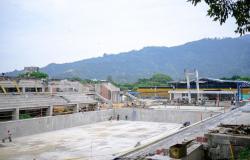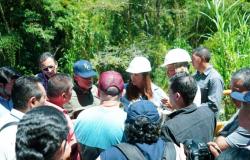The project seeks to guarantee optimal biosafety and environmental conditions in practical activities, thus promoting a culture of prevention and sustainability.
The Faculty of Pharmacy of the University of Valparaíso developed the project “Implementation of safe and sustainable work spaces in teaching laboratories”, with the aim of ensuring safe and sustainable environments for the practical training of its students.
The initiative proposed by the Faculty of Pharmacy in conjunction with the School of Chemistry and Pharmacy, and financed by the Investment Project Bank of Valparaíso University (BPI), focused on addressing critical challenges and improving laboratory infrastructure, guaranteeing optimal biosafety and environmental conditions in all practical teaching activities carried out by academics, technicians and students.
Jacqueline Concha, vice dean of the Faculty and director of the project, explained that the BPI financing made it possible to provide appropriate shelves and counters for the storage of materials and equipment in the teaching laboratories, as well as to acquire collective protection elements, such as fire blankets, anti-spill kits and portable eyewashes. In addition, storage cabinets for dangerous substances and hazardous waste were obtained, complying with health regulations and promoting a culture of risk prevention and sustainability in the Faculty’s courses.
The implementation of these measures is expected to have a significant impact on the safety and quality of student learning, as well as the well-being of technicians and teachers participating in practical activities.
“Improving safety conditions in teaching laboratories has been a comprehensive response to various challenges. This has involved strengthening the teaching-learning processes, meeting the objectives established in the Faculty’s Strategic Development Plan, promoting a culture of safety and sustainability, and guaranteeing compliance with regulations issued by the Ministry of Health and the Ministry of the Environment. Environment,” he said.
Jacqueline Concha explained that the Faculty of Pharmacy, with two undergraduate teaching programs accredited for six years—Chemistry and Pharmacy, and Nutrition and Dietetics—has distinguished itself for innovative study plans aligned with the UV educational model. Its eight laboratories, three of which are intended for basic experimental teaching, serve students from first to fourth year, with an average daily occupancy of fifty students per laboratory.
“These measures will be added to a series of actions adopted to protect the educational community in teaching laboratories, which include the development of manuals for the storage of dangerous substances, an internal management plan for hazardous waste, basic rules of safety and hygiene for laboratories, a general regulation for the use of teaching laboratories, and integration into the RETC single window system, for the declaration of hazardous waste generated in teaching.”
The vice dean clarified that these initiatives are aligned with the Fondecyt – Conicyt Biosafety Standards and Associated Risks Manual (2018), and are a comprehensive tool that provides guidance on biosafety requirements in different areas of development.
“This guarantees correct handling in the laboratory, in compliance with existing legal regulations, and promotes a safe and conducive environment for practical learning for students,” he concluded.
Note: Pamela Simonetti







